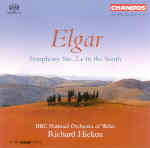Too many orchestras, too few great conductors, making too many recordings of the same music, and quality is bound to suffer. It may be that British labels see it as their patriotic duty to record Elgar’s symphonies with every conceivable combination of British ensemble and music director, but that’s no excuse for the anemic sound of the BBC National Orchestra of Wales, nor does it explain how Richard Hickox has the chutzpah to inflict on this music an interpretation so wimpy and expressively neutral. After all, he did well by the choral works–but then he also had the LSO on hand for those, and they probably know the music far better than he does. Indeed, despite some early successes, when he isn’t conducting vocal music of some sort Hickox has revealed himself most recently as a thorough second-rater, singularly devoid of ideas or the means of getting orchestras to give him their best efforts–witness his vile Vaughan Williams series, LSO or no.
So here we have a thoroughly provincial reading that will give ample ammunition to those who insist that Elgar’s music doesn’t travel well. Just about every decision that Hickox makes is a bad one. His timing is off throughout the first movement. Has the moment of recapitulation ever been this badly judged? Elgar himself is even quicker, naturally, but never sounds so. He knows when to speed up, when to slow down, and most importantly, by how much. Even the opening ritard that launches the symphony fails to sound properly in control. The music lurches out of the gate like a false start at the raceway. And has any conductor ever glided through the haunting development section in so comatose a fashion? Listen to how the “malign influence” tune, when it first appears, lacks all color, any vestige of menace. Where is the Elgarian “nobilmente” in the grand climaxes of the second movement, and why doesn’t the pounding climax of the third movement really pound? Then there’s the droopy finale, a tough movement to bring off at the best of times, and here the very musical embodiment of “flaccid”. Really folks, it’s just awful.
In the South, an almost foolproof piece of orchestration, fares no better. You have only to compare this tepid example of sight-reading to Alexander Gibson’s stunning recording for this same label to see how low standards have sunk. The Welsh orchestra’s strings sound undermanned, lacking in heft. Indeed, they are routinely dominated by the two harps, though that may be a freak of the oddly recessed, low-level engineering that in both stereo and multi-channel formats lacks the necessary color and impact. There’s also no bass, aside from the drum kind. Cellos, basses, trombones, and tuba might as well have not showed up for all the contribution they make to orchestral tuttis. Mind you, this isn’t so much a function of volume as it is of sonority, of top-to-bottom balance, that special ripeness of texture that makes Elgar’s scoring so rich and warm. Hickox & Co. might as well be playing late Stravinsky.
Anyway, enough said. This is a shabby piece of work by all concerned, and a sad day for the composer. Barbirolli also recorded this symphony with a lousy orchestra (Hallé), but then he was a first-class conductor who could work the occasional miracle. He also was truly loved by his musicians, who accordingly would rise to the occasion and surpass themselves. Who, I wonder, aside from Chandos, loves Hickox?
































